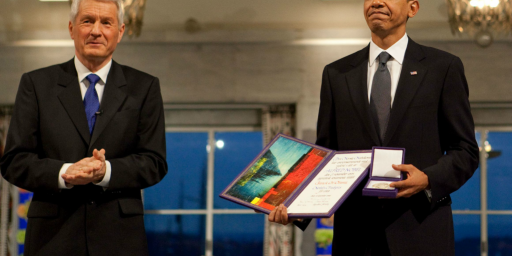Things Aren’t As Bad As You Think
Despite our rather obvious problems, we're in great shape compared to the rest of the developed world and, especially, to even our fairly recent ancestors.
A couple of Thanksgiving columns encourage Americans to look on the bright side: Despite our rather obvious problems, we’re in great shape compared to the rest of the developed world and, especially, to even our fairly recent ancestors.
Fareed Zakaria (“Be thankful — sensible solutions do exist for U.S. problems“) considers our relative position in the world.
The United States continues to have the most dynamic economy in the developed world. We are enamored of Germany for having maintained its manufacturing base through timely reforms. That’s good, and we could learn a lot from other countries. But let’s note that Germany’s great companies are products of the second industrial revolution — from the early 20th century — clustering around cars, chemicals and machine tools. Germany has one notable company in the information economy, SAP. The post-industrial, information economy is dominated by the United States. The industries of the future, from biotechnology to nanotechnology, are dominated by the United States. The best research centers, universities and companies remain American.
We also have the most dynamic society in the developed world. While Japan has entered and Italy and Germany are approaching a demographic death spiral, the United States remains young, vibrant and active. Demographics is not destiny, but it helps mightily to have a growing society, with a healthy share of young workers — who are also taxpayers. This country still attracts the most immigrants and most investment in the world.
[…]
We should worry about what’s happening in Europe. But really, those problems are of a different order. Greece and other countries have debt problems. But they also have much larger competitiveness problems: They don’t make much that the world wants to buy. Italy’s economy has not grown in more than a decade. And crucially, these countries’ debts are denominated in a currency that they don’t control. The United States, by contrast, controls its currency, which is also the world’s reserve currency. That might produce a lack of discipline that has long-term risks, but it is unlikely to produce a European-style debt crisis anytime soon. Notice that as Europe faces its troubles, the borrowing costs for the United States keep dropping.
He even makes a semi-plausible case that our political gridlock isn’t as bad as it might seem.
Meanwhile, Nick Kristoff (“Are We Getting Nicer?“) takes some long view lessons from Steven Pinker’s new book The Better Angels of our Nature.
Despite the gloomy mood, the historical backdrop is stunning progress in human decency over recent centuries.
War is declining, and humanity is becoming less violent, less racist and less sexist — and this moral progress has accelerated in recent decades. To put it bluntly, we humans seem to be getting nicer.
[…]
Still, even in a 20th century notorious for world war and genocide, only around 3 percent of humans died from such man-made catastrophes. In contrast, a study of Native-American skeletons from hunter-gather societies found that some 13 percent had died of trauma. And in the 17th century, the Thirty Years’ War reduced Germany’s population by as much as one-third.
[…]
Look also at homicide rates, which are now far lower than in previous centuries. The murder rate in Britain seems to have fallen by more than 90 percent since the 14th century.
Then there are the myriad forms of violence that were once the banal backdrop of daily life. One game in feudal Europe involved men competing to head-butt to death a cat that had been nailed alive to a post. One reason this was considered so entertaining: the possibility that it would claw out a competitor’s eye.
[…]
There is global consensus today that slaughtering civilians is an outrage. Governments may still engage in mass atrocities, but now they hire lobbyists and public relations firms to sanitize the mess.
In contrast, until modern times, genocide was simply a way of waging war. The Bible repeatedly describes God as masterminding genocide (“thou shalt save alive nothing that breatheth” — Deuteronomy 20:16), and European-Americans saw nothing offensive about exterminating Native Americans. One of my heroes, Theodore Roosevelt, later a winner of the Nobel Peace Prize, was unapologetic: “I don’t go so far as to think that the only good Indians are the dead Indians, but I believe nine out of ten are, and I shouldn’t like to inquire too closely in the case of the tenth.”
Granted that Barack Obama, the winner of the 2009 Nobel Peace Prize, radically escalated our war in Afghanistan, stepped up the drone war in Pakistan, orchestrated a war in Libya, and hosted a dinner for the man who placed the 2010 Nobel Peace Prize winner under house arrest, we’re at least at the point where we try to limit the killing in wars to combatants.







Plenty to give Thanks for here.
Happy Thanksgiving to everyone…including the wingnuts.
We do have so much to be still be thankful for,mostly where and how we live. Enjoy your turkey and don’t forget the Cranberries http://www.youtube.com/watch?v=6Ejga4kJUts&feature=relmfu
The nation’s financial fundamentals are sound. Assuming we ever get our financial industry under some semblance of control there’s no reason to be anything but hyper-bullish on our future.
Darn it, G.A.! Some warning next time, or perhaps a different Cranberries song, yes? 🙂
Happy Thanksgiving, Everyone!
@G.A.Phillips: Nicely played sir